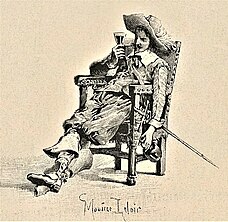|
Athos (character)
Athos, Count de la Fère, is a fictional character in the novels The Three Musketeers (1844), Twenty Years After (1845) and The Vicomte de Bragelonne (1847–1850) by Alexandre Dumas, père.[1] He is a highly fictionalised version of the historical musketeer Armand d'Athos (1615–1643). In the novelsIn The Three Musketeers, Athos, Porthos, and Aramis are friends of the novel's protagonist, d'Artagnan. Athos has a mysterious past connecting him with the villain of the novel, Milady de Winter. The oldest of the group by some years, Athos is described as noble and handsome but also taciturn and melancholy, drowning his secret sorrows in drink. He is very protective of d'Artagnan, the youngest, whom he eventually treats as his brother. By the end of the novel, it is revealed that he is the Count de la Fère. He was once married to Milady de Winter and attempted to kill her after discovering that she was a criminal on the run, an event which left him bitter and disillusioned. However, during the course of this novel, he is able to get his revenge on Milady. In the second novel, Twenty Years After, he has retired from the Musketeers and abandoned his nom-de-guerre of Athos. He has fathered an illegitimate son, Raoul, with Marie de Rohan (Aramis's former mistress) and then adopted the boy, making him the vicomte de Bragelonne. Fatherhood makes Athos a much happier man, but after launching Raoul into a military career, Athos looks for new causes to occupy his life. He embraces the Fronde and then a doomed mission to rescue Charles I of England. He is uncharacteristically terrified by the appearance of Mordaunt, Milady's son, who is attempting to avenge the death of his mother. Athos, despite his reluctance to engage with the son of his ex-wife, ends up forced to slay him in an underwater fight in the English Channel. In the third novel, The Vicomte de Bragelonne, Athos takes a major behind-the-scenes part in historical events, first helping with the restoration of Charles II to the throne of England and then being entrusted with the diplomatic task of arranging the wedding of Henrietta of England and Philippe I, Duke of Orléans. Athos eventually falls out with King Louis XIV of France, who has seduced his son Raoul's fiancée and is briefly thrown into the Bastille for voicing his contempt. After being pardoned at d'Artagnan's instigation, Athos withdraws to his home, where he dies of sorrow after Raoul is killed at war. Athos's first name is never told in the novels. However, in Dumas's play "The Youth of the Musketeers," the young Milady, then named Charlotte, calls him "Olivier." SourcesThe fictional Athos is named after the historical musketeer Armand, Seigneur de Sillègue, d'Athos, et d'Autevielle ("Lord of Sillègue, Athos, and Autevielle"), better known as Armand d'Athos, though they have little in common beyond the name. His birthplace is the commune of Athos-Aspis in the Pyrénées-Atlantiques department. The name also resembles Mount Athos; in chapter 13 of The Three Musketeers, a Bastille guard says, "But that is not a man's name; that is the name of a mountain." His title, Count de la Fère, while invented, is tied to the domains of La Fère which were once owned by Anne of Austria, Queen of France in these novels and in the historical period in which they are set. Film and television portrayalsWikimedia Commons has media related to Athos.
Other mentionsThe South-East Asian stone loach Schistura athos is named after the character of Athos and there are two more species in the genus Schistura which are each named after one of the Three Musketeers, S. aramis and S. porthos.[2] References
|
||||||||||||||||||||||||||
